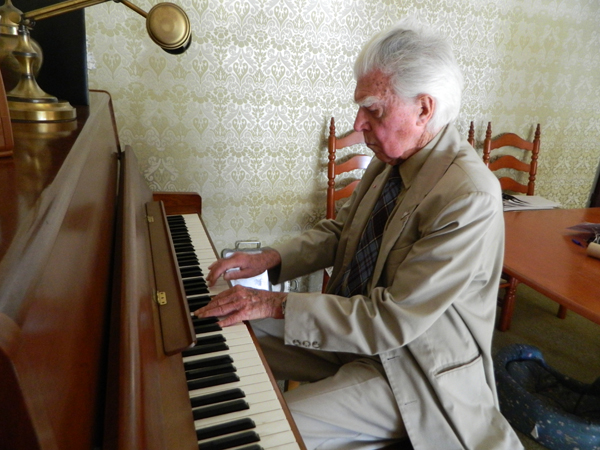John Duggan’s 93 year-old hands slide easily across his piano’s ivory keys.
He looks focused on playing the tune, and only stops to fondly remember the days of playing music for an audience. While his memory is fading, he’ll never forget playing with a band on stage at a bar in the early 1940s.
And, performing for an audience with war buddies on the streets of London.
“I can say that I had been a busker on the streets of London,” he says with a smile from his piano bench, which is situated in his Westboro dining room.
While playing the piano brings back memories of entertaining others, it also brings back warm thoughts of playing for his late wife, Adelina.
The couple met during the Second World War. He was in Canada’s air force, and she was an adjutant (or a military officer who was an administrative assistant to a senior officer) in the British Air Force.
She was a Scottish woman, Duggan says, and no more than five feet tall – but intelligent, quick, and sharp-minded.
On Remembrance Day, he says he doesn’t think much about his own service to his country. Instead, he often thinks about Adelina, and her service during the Second World War.
“I understand war is like hell,” Duggan says, adding that he believes Adelina endured more danger in the Second World War than he did.
“My wife had a bullet bounce off her tin hat, she endured bombing, she was caught in a burning building. She was prepared to die and be roasted to death. She had a very interesting war.”
He says the Holocaust, and the treatment of Jewish people in Europe, was a brutality that stuck with his wife before, during and after the war.
Duggan says her father was a gas company executive, and had taken her on a visit to Germany before the war started.
What she saw was permanently ingrained in her memory.
“She saw Jews brushing the cobblestone roads with toothbrushes, wearing the star,” Duggan says. “She was very sympathetic towards the Jews.”
However, he begins to smile slightly as he thinks about how his wife – who had learned to speak German – also played a role in interrogating German prisoners.
“My wife was five-foot-nothing, so these big, honking German prisoners figured this would be a snap,” Duggan says. “But they didn’t know my wife. She had a mind like a steel trap, and when she started asking she would go on, asking the same question in a dozen different ways. She tied these guys in knots. Oh, she had fun.”
Memories of his wife are still alive in his living room – including her custom-made chair, which has a straight upright back so the feet on her short frame could touch the floor when she sat.

A visitor to Duggan’s home is also welcomed by two plaques that hang on the wall, showing he and his wife’s family crests – one for Duggan, and one for his wife’s maiden name, Stewart.
The stories she told Duggan at their kitchen table also remain with him, especially on Remembrance Day.
“I think of her quite often,” he says.

